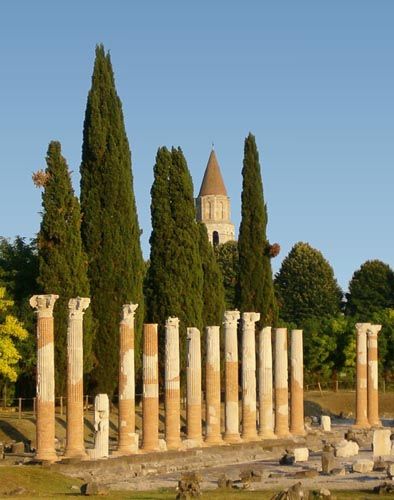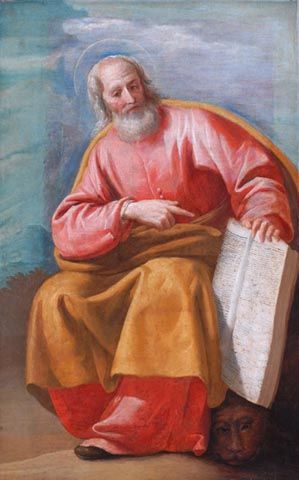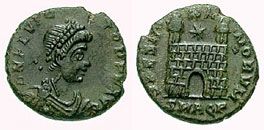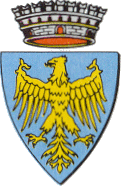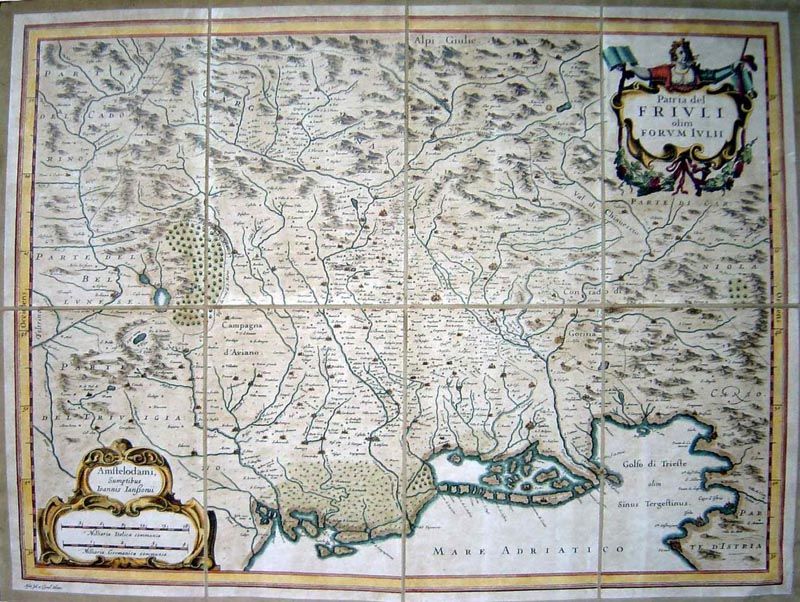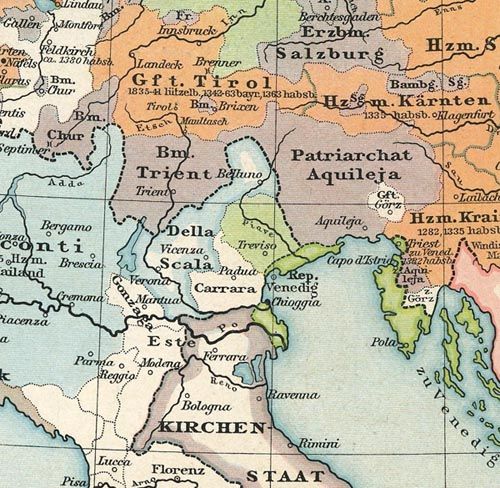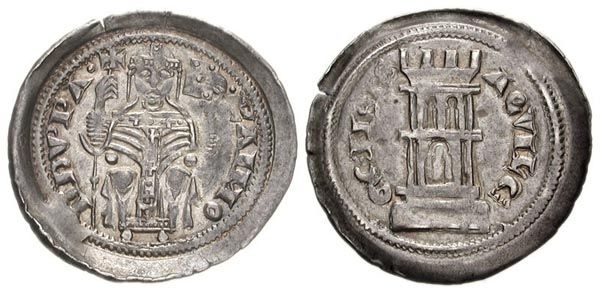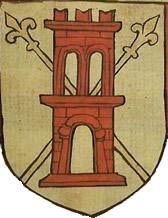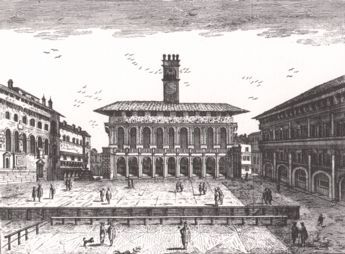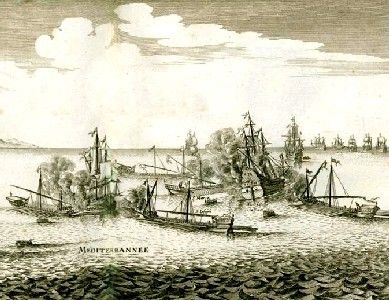Change of centuries (1399-1403)
Political map dated on October, 14th 1399
It was autumn of 1399 when Archbishop Antonio Caetani returned to his residency in Udine, for first time in 14 months. His home was Rome, and he never left it, even after becoming Archbishop of Aquileia. And nothing showed that things will change this time as people were not delighted with his reign. Neither he was with people. Nobles continued their ruling and Aquileia is decentralized for ages resulting in really bad stability. And with two powers sitting on shoulders of country and ever-present Venezia, it seems like end is near and Patria del Friuli won't make it into new century. Antonio isn't interested at all to interfere with noble-peasants-Venetian triangle, at least he wasn't during his first 55 months of reign. Pope Boniface VIII's sibling maybe just isn't meant to be ruler of our beloved country.
Decentralization of country was main problem
Things started to change in October 1399 when statesman from Gorz, Ottobuono Sopransi, arrived for a meeting to Antonio's palace.
"Your Grace, the most reverend excellency, I'm so glad you accepted to meet me.", Otto said as he kneeled and kissed Archbishop's sacred ring. "My name is Ottobuono Sopransi and I'm local statesman. I would like to talk with you about state of our beloved Aquileia."
Otto was young and handsome, well dressed and so humble. Probably he was the only statesman who tried to change things around since being elected in spring. He tried everything and was really desperate, otherwise he wouldn't try to visit Archbishop.
"Mister Sopransi, I'm glad to meet you too. My personal assistant told me you want to address. However, it's not so clear what is the purpose of this meeting."
"Your Grace, with current situation in hand our four provinces won't stay in Aquileia for long. Not that I attack you, Your Grace, nor your ruling, but noble has took too much power and Venetians are trying from inside to make our land defect to their republic.", he was direct and was scared that his approach may get him hanged. But he had no other choice.
"I know son, I know.", Antonio replied. "But with no help from outside there isn't much I can do about it. Maybe I shouldn't have left Aquileia. This situation is really getting out of hand. And you are here to propose something?"
Surprised with Archbishop's response, Otto needed few second to get together, he finally made it through and his voice is heard. "Yes, Your Grace, I..."
Antonio interrupted him: "No need for Your Grace thing. You can call me by my last name. It's Caetani. Continue."
"Your Grace, uhm, Mister Caetani, you need to take things in your own hands. You need, you really need to centralize power and rule this country. Nobles are killing each other for few achres of land. And would sell their souls just for few denaros."
"Allright my son. I already know that. But how to strip them of power and not get killed?"
"There must be way.", Otto was suddenly confused.
"I will think about it and will send my assistant with response in few days."
It was October, 3rd. For seven days Otto waited for response, becoming more and more nervous. And just as he was leaving council room on eight day, emissaries came. Archbishop called for him. Deal was struck in lighting manner, Antonio I Caetani was preparing to take over Patria del Friuli, land he lays hand on. New Pope gave it to him maybe just because of his late uncle, Boniface VIII, but he decided it was time to defend his heritage. For sake of his ancestors, for sake of Aquilean people.
On October, 14th one thousand men came from Romagna, infantry regiment Pope sent on request of Antonio. At 6:00 they were in front of palace and it was a sign, sign for Antonio to call important people for big council meeting to his residence. Among clergy and noblemen, Otto arrived, as well as local minter Paolo Borromeo and country treasurer Fabrizio Testi. Feeling secure with small army in near sight Archbishop told noblemen that he is taking over internal ruling of Aquileia. He also took gold mines and mints from their possesion leaving noble with just their estates to manage. At least he didn't revoke their council seats.
As they left he addressed his new advisors, Sopransi, Borromeo and Testi: "We made first step, and cannot go further for at least five years. But we made first steps." Afterwards they discussed state of country. With 4 provinces and two gold mines Aquileia had target on map of Austria, Hungary and Venezia. Unless they manage to make new friends and alliances end is near. That's why Antonio took 22 gold coins and sent together with letter to Albert IV von Habsburg, King of Austria. His first diplomatic step was decision to get relations with Austrians and Habsburgs improved maybe followed later with alliance proposal. Financial situation was rather good with more than 20 ducats coming in per year and it was Borromeo's job to reduce inflation caused by gold mining. They agreed that for now balanced approach was the best, with goverment and trade just ahead on priority list as trade in Venice could improve country's financial situation and goverment should improve to more easily deal with nobility. Later that day, as advised by Sopransi, Antonio moved national focus eastern to Gorz.
Just few days later letters started to arrive. Urbino, Montenegro, Milan and Achaea offered military alliance as they heard Archbishop took over his country back from nobility. Among these letter from Pope came in which he expressed his gratitude to allowance of military access as well as congratulations to Antonio for getting grip. For first time Antonio spoke in front of large crowd and people were delighted with change of policy which is now seen as positive one throughout catholic Europe. In that speech, which lasted over two hours, every action was explained and military alliance with Milan announced together with Liquor act. Reforms were coming quick and coming fast.
It was becoming quiet in Udine with everyone doing their job during first few months of Antonio's active rule of Aquileia. But he couldn't stand still in his palace and went on diplomatic tour along Adriatic coast. During November and December he visited Salona in Dalmatia, city of Ragusa, Kotor in Zeta and almost all Italian coast cities in east. This trip resulted in improvement of diplomatic relations with neighbours and two new military alliances, with Ragusa and Papal States. Archbishop was happy as he came back to Udine, happiest he ever was in Friuli. Domestic situation was calm and stability steadily improved as days passed by.
"Your Grace, Your Grace! Venetians are opening trade station in Pula.", Fabrizio Testi was excited as he entered palace just few days into new year. "It might be minor gain in trade, but it shows we are respected in the area."
"Oh, it's you Mister Testi. Why are you shouting?", Antonio replied calmly.
"I'm sorry. I'm so glad everything gets better. You have changed country in just six months."
"Maybe, but we're just at the beggining. Are you here just to shout or you have some more news?"
"Uhm... Uhm... Nothing else Your Grace. Just wanted to share the joy. I'm sorry if I interrupted you in something.", Testi was blushing now, but still with spark in his eyes.
"Do not worry. But I will prefer to be left alone."
"Till we see again, Your Grace."
Testi left palace swiftly and decided to share his joy around Udine. This 30 year old bishop treasurer was appointed 6 years ago after finishing high schools in Venice, but was quickly marginalizied and couldn't do much work until October.
Early 1400 was marked with revolutions all around region. Rebels and pretenders unsuccessfully battled in Austria, Milan, Hungary and Montenegro. Milan took Ferrara under it's sphere of influence and Papacy warned Urbino not to start any wars, while Naples were finishing thing in Epirus. Things at home could be named boring, but that is very much what our ruler wanted.
In May Achaea sent third letter pleading for military alliance, but Antonio refused once again as he couldn't see any positives in long distance relationship between two minor nations despite Achaea having strong bond with Pope. And just as he was writing his final and hard no his two Udine based advisors entered the room.
"Your Grace, we have just been informed that Beneficio is marching towards Ancona.", Testi said.
Otto quickly continued: "Did you know that? Should we equip our men? In addition to our only regiment we can get three more in under three months."
"Wait there. Slow down Otto. So, Boniface started his Urbino agression?"
"Yes. Information we got from our friends in Romagna is that they should reach fort of Ancona in dawn."
Antonio wasn't surprised. Surely he knew what Boniface would invade Urbino in attempt to connect his two provinces. After all he prepared for war with Ferrara just to be interrupted by Milan's guarantee of independence.
"I think Urbino must fall.", Antonio replied. "Otto, please arrange that our regiment board ships and send all of our fleet there. But be careful, do not invade Ancona province before I give you such order."
"You mean you are sending Otto to war, Your Grace?", Testi couldn't believe what he heard. Top statesmam was about to leave to fight and possibly lose his life.
"Of course I am. He will stay on deck of command ship and won't engage in fights. Right Otto? You won't fight, you will just observe.", Antonio had an idea.
"As you wish Your Grace."
"And please, stop calling me Your Grace. I hear it every day at least thousand times. And mostly you two and Paolo are those who are addressing me with title. Mister Caetani is fine, Antonio is also fine. I act as a leader to you, when we are in public you can call me formally."
"Yes Your Grace, as you wish.", Otto said before room bursted into laughs. Who could tell that one of them is going to war.
It took two months for invitation to war to arrive from Rome. But it arrived in July and Ottobuono got green light for military action. He was on command ship to just observe and wait for all combats to finish. And Urbinese troops were almost anihilated, except those defenders of city. Aquileia's only regiment, Papacy 1st, marched into foreign land and were ready to help their brothers from Rome in sieging the fort. Month later Naples declared war on Urbino, hoping like a vulture to get something if Pope fails. They conquered Epirus in 6 months and were eager to do some more combats.
After two months we entered war with small stability cost
Otto was on ship for month before going to Romagna in Papal headquarters and was learning new things, while Testi and Paolo Borromeo stayed in Aquileia doing their regular bussines. Testi was in charge of trade, and not much successfull as merchants went in and out of Venice month after month. Paolo on the other hand was on relation Gorz-Krein, taking care of gold mining and minting. He was advisor with least contact with Archbishop, yet his word was golden and Antonio accepted his every advice, his every plan during this first year of friendship.
Situation was looking good in autumn, but Milan's warning against Pope and his expansions was enough to trigger nervous people in Italy. Just month later Jacopo Gonzaga took his troops to siege of Pisa as he claimed his right to throne of Milan. Our beloved leader recieved two very harsh letters late in 1400 from dear friends. Pope Benificio informed our court of Aragon's influence on him and people of Ragusa are under direct threat from Hungary who expanded influence accross Balkan pennisula. Archbishop entered new year with few worries. Austria was good, with not a single unit on borders, while Hungary had several troops near Istria. Venetians were building army, but apparently for some Mediterranean conquest.
Boring stuff continued to happen in Aquileia during first half of 1401. In June siege of Ancona finished and Urbino was annexed by Papal States and Pope was really satisfied with his allies and their help. Just two weeks later Achaea declared war on Byzanthine in their quest for Morea, and Byzanthines were already in war with Candar and Karaman. Archbishop was sorry now he didn't have that alliance, but would later found out from Benificio's letter that Pope doesn't approve such war in attempts to make amends with Eastern Christians.
August saw Istria becoming part of HRE, an event that improved our nations relationship with Emperor of HRE, Kingdom of Bohemia. In same month Venetians started their reconquest of Zeta, war that lasted just two months resulting in annection. Things at Hungarian borders were serious and Archbishop was worried with reason.
With Istria joining all of our provinces are part of HRE
Letter arrived on November, 15th as top priority and Antonio called council. It was matter of national interest. Clergy, nobility and advisors came, very worried about news.
"I'm so sad to inform you that our brothers in Ragusa are under direct attack of powerful Hungarian army...", Antonio couldn't finish the sentence before his words would vanish in loud talk. "Calm down. Calm down. CALM DOWN!!!"
"We have two options in front of us. To go and help or to betray our friends and brothers. And I know everything, I've been thinking about this scenario for long time.", he tried to calm council members.
"First one would be heroic, as we have only one regiment ready to fight and wouldn't have much chance against opponent who has better weapons and outnumbers us. At best, we would lose our gold provinces with mainly Austrian population. The other one, however, is my prefered choice. Our reputation will tarnish, but we will save our heads. I just wanted to let you know that. We shall remain at peace."
Antonio seemed confident about his decision, but he almost cried when he wrote letter back to Montenegro in which he informed them that he cannot help as Aquileia is short of soldiers. Declaration of war would just postpone anihilation, and Hungarians would anihilate both countries. Europe looked at Aquileia as a traitor, and if it was of any comfort, reasonable traitor, who had no other option available.
January went stressful and Naples guarantee of our independence didn't change much. Antonio was sure that they had some hidden reasons for doing such thing. Was it possible they wanted to fight with Hungarians who had small navy or to provoke our alies? We will surely find out later. Castille became defender of faith, does that means they will defend us also? Antonio thinks it's all just a show.
An insult, but still helping hand if Hungarian knock on our doors
And what of show is in Greece. Morea changed owner and it wasn't Achaeans who got their hands onto their ancient lands, but Karaman. Born in belly of Ottomans they managed to spread lands in south of Turkey and now gained precious Greek province after totally defeating Byzanthines. Morea on the other hand now has a chance to claim Thrace and Constantinopole itself.
Early in March Naples and Milan joined English-French war as opposed sides with strong armies. Everyone expects that Napolitans will invade Pisa and Siena as they are under control of pretender for some time now. 8000 men from Urbino stood up against agressor and started a revolt in Ancona, lead by Oddantonio Braschi, former Milanese general. As always thing in Aquileia are going slow and Antonio thought it was time to spice things up.
"Otto! Come here, please!", Antonio shouted.
"Yes? What can I do for you?"
"Is there any chance of getting more population in our cities?"
"Hardly. We could only try to lure Lombardians from other Kingdoms and Duchies to come to our country, but that is a long shot."
"I like that idea. That means we must put out some gold for them?"
"Not at all, we have lot of opening in our mining industry and opportunity to work and live peacefully for our compatriots is our only chance."
"So, what are you waiting?"
"Well, Your Grace, I'm sorry to say this, but by enabling that settlement we would probably angry our neighbours in Austria, as our golden provinces are those with Austrian culture. They would not like to see we are getting Lombardians in on behalf of relative natives."
"Who cares? They can attack us this way or another. Please proceed with plan."
"As you wish. But, I have one question. Which province?"
"The one with better chance of succeeding. That's such a silly question."
"I will look into it and supervise myself."
"That's the spirit Otto, that's the spirit."
And that's how settlement of Krain begun. Only other notable things that happened in 1402 is that Ragusa got annexed by Hungary and that Pope and Archbishop spent their holidays together in Romagna.
New year started with alliance between us and Toscany and continued mainly with court humour around Pope's inability to suppres those rebels in Ancona, who got into his favorite summerhouse in Romagna as well. But that humour was miles away from Archbishop who was very fond of Pope. After all, he appointed him here and helped him throughout the years. Milanese accepted white peace with England, meaning their war with Naples ended as well. Without even one casualty. And they called it war. Gonzaga is going up and down his "liberated" provinces of Siena and Pisa unable to break out to main Milan's provinces, but better for him as regular army outnumbers his in ratio 3:1.
Alpes are white in November, and winter came early to Aquileia. Boredom with lack of internal affairs can be positive as every non-clergy member of council went to mountains for some recreation. Clergy however stayed as they planned something big. And big things happened on November, 28th when Archbishop got letter from Pope.
"My dear friend,
I'm glad I can inform you we managed to appoint Monsineur Paradisi of Krain as Cardinal in The Holy See. Our preparations were complete just in time, as Cardinal Kesgaila died, aged 93, few days ago. Please inform Cardinal Paradisi of this and his obligations to me as well as to The Holy See.
With kindest regards,
Boniface VIII"
News traveled fast causing big joy around our nation. Everyone was so proud we have our own Cardinal.
Map of Europe dated November, 20th 1403





